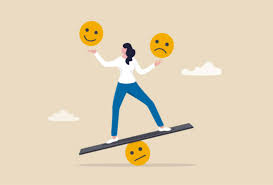In our fast-paced, hyper-connected world, achieving emotional equilibrium can feel like chasing a moving target. From career stress and personal obligations to global concerns and digital overload, modern life constantly tests our mental resilience. “Restoring Balance: Mental Health Support and Emotional Wellness” is not just a call to slow down—it’s an invitation to reconnect with ourselves through intentional support systems and holistic well-being.

Understanding the Concept of Balance
Balance in mental health isn’t about avoiding stress altogether—it’s about developing the inner capacity to weather challenges with grace and flexibility.
A balanced mental state is:
- Adaptive: Able to cope with life’s ups and downs.
- Grounded: Rooted in self-awareness and clarity.
- Resilient: Capable of bouncing back from setbacks.
Mental health isn’t static. Just like physical fitness, it requires regular nurturing and attention.
Recognizing the Signs of Imbalance
Emotional imbalance often shows up subtly before becoming overwhelming. Signs include:
- Constant fatigue or low energy
- Irritability and mood swings
- Difficulty concentrating
- Withdrawing from social interactions
- Sleep disturbances
- Unexplained sadness or anxiety
Listening to these signals early allows for proactive care instead of reactive crisis management.
The Power of Support Systems
A strong support system acts as an emotional anchor during turbulent times.
Types of support systems include:
- Personal relationships: Friends, family, and trusted confidants provide a space to vent, reflect, and receive encouragement.
- Professional support: Therapists, counselors, and coaches offer guidance rooted in clinical understanding.
- Peer groups: Support groups, whether in-person or virtual, create a sense of shared experience and validation.
Leaning on others isn’t a weakness—it’s a healthy strategy for growth and healing.
Therapy as a Tool for Balance
Therapy offers more than just a space to talk. It’s a structured method for identifying patterns, reprocessing past experiences, and developing tools for emotional regulation.
Common therapeutic approaches include:
- Mindfulness-Based Therapy: Encourages present-moment awareness and acceptance.
Mindfulness and Emotional Wellness
It’s not about silencing thoughts but about becoming aware of them with curiosity and compassion.
Daily mindfulness practices can include:
- Deep breathing or body scans
- Meditation
- Journaling thoughts and emotions
- Nature walks without distractions
Research shows that mindfulness reduces stress, improves focus, and enhances emotional resilience. When practiced regularly, it becomes a cornerstone of balanced living.
Lifestyle Habits That Foster Mental Health
Creating a mentally nourishing lifestyle doesn’t require radical changes. Often, it’s about integrating small, consistent habits that align with your values and needs.
Key practices include:
- Quality sleep: Restorative sleep is essential for mental clarity and mood stability.
- Digital boundaries: Limiting screen time, especially on social media, helps reduce comparison and information overload.
The Role of Environment
Our surroundings influence our mental state more than we realize. Creating environments that support calmness and clarity can enhance emotional well-being.
Suggestions for a balanced environment:
- Declutter spaces to reduce sensory overload
- Incorporate natural light and indoor plants
- Create a designated “unplug” zone for reflection or relaxation
Even subtle shifts in your physical environment can make a big difference in your emotional equilibrium.
When to Seek Professional Help
There’s no shame in asking for help. In fact, it’s one of the most courageous acts of self-care.
Consider reaching out to a mental health professional if:
- You feel overwhelmed most days
- Emotional distress interferes with work, relationships, or daily activities
- You’ve experienced trauma, grief, or major life transitions
- You’re considering harmful thoughts or behaviors
Early intervention leads to better outcomes. Mental health is just as important as physical health, and both deserve equal care.
Restoring Balance Is a Lifelong Journey
Mental wellness isn’t a destination—it’s a lifelong journey of tuning in, adjusting, and learning. By building strong support networks, embracing mindfulness, and seeking professional guidance when needed, we empower ourselves to restore and maintain emotional balance.
A balanced life is one where challenges are met with grace, emotions are expressed without fear, and support is both given and received. Let this be your reminder that it’s not only okay to ask for help—it’s a vital part of healing and growing.
For more insights and mental wellness support, visit https://mindzo.us.